In 2015, the Italian pianist Marco Sanna and his duo partner saw on Facebook that an artist management company called Xenia Evangelista Communications was signing new performers. They sent the company an application, including a cover letter and a CD, in the mail. Soon after, Evangelista, who is based in Munich, emailed the duo expressing interest in working with them, though she had never heard them play live. Sanna and his partner were flattered. They were at the beginning of their careers, and excited at the prospect of joining a roster that included renowned artists like the Berlin Philharmonic principal clarinetist Wenzel Fuchs and the Italian pianist Giuseppe Albanese. On May 21, 2015, Evangelista wrote that her research on the duo was complete and emailed them a draft contract. Under what Sanna later described as “lots of pressure” from Evangelista, the duo signed the contract in early July.
Sanna and his partner, who declined to be named for this story, agreed to pay a monthly base fee of 300 euros and a commission of 10 percent of their fee on all concerts acquired through Xenia Evangelista Communications. The agreement had a minimum length of one year. In return, the contract stipulated, “a specific number of performances per year, a specific work volume or a specific total revenue is not guaranteed.” Sanna and his partner also agreed to a non-disclosure agreement with Xenia Evangelista Communications, valid during and after the end of the contract.
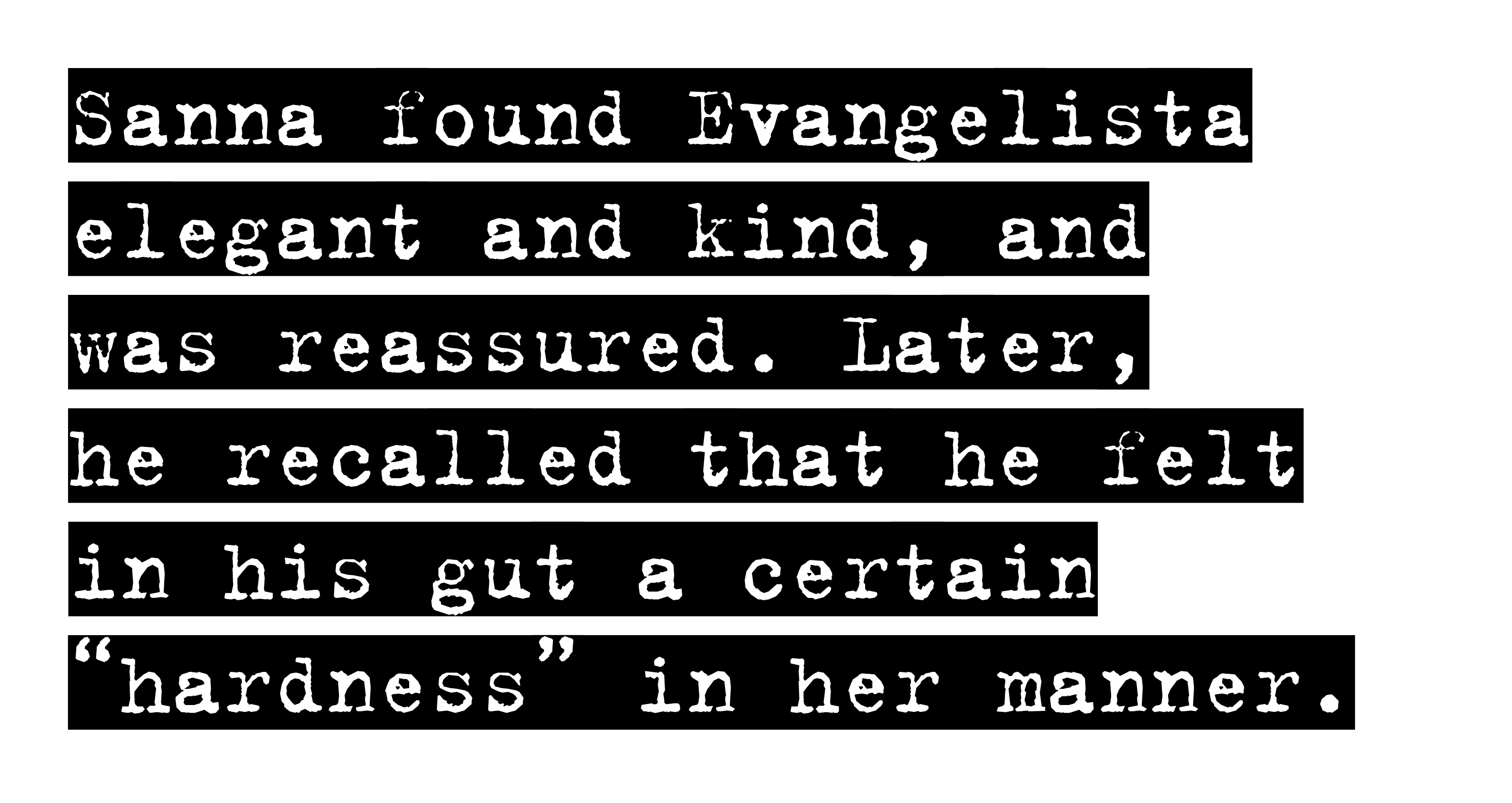
In May, Sanna and his partner asked Evangelista for a face-to-face meeting. On the afternoon of July 7, Evangelista took the duo out for lunch at a Munich restaurant called Amadeo. Sanna found Evangelista elegant and kind, and was reassured. Later, he recalled that he felt in his gut a certain “hardness” in her manner.
Months went by with little contact between Evangelista and Sanna. In May 2016, Sanna wrote to her asking for a video of the duo’s performance to be shared on the agency’s social media pages. (The company has close to 10,000 likes on Facebook.) It bothered Sanna that other musicians had been presented there, while his duo hadn’t. In the same email, he told Evangelista, “We have been considering you, and we still proudly do of course, our Manager, and in you we trust.” At the end of the month, Evangelista agreed to share the video, adding, “Until now, we are actively approaching approximately 330 active contacts.”
But by June 28, 2016, Sanna was fed up. The duo had been officially represented by Xenia Evangelista Communications for a year and hadn’t been booked for a single concert. Sanna emailed Evangelista, announcing the duo’s intention to cancel the contract with her. That’s when the tenor of their conversations changed.
Davide Bravo, an Italian violist in his 30s, who performs with a string trio called Trio Hegel, connected with Xenia Evangelista in the spring of 2018, either on Facebook or LinkedIn, he recalled. As far as he knew, Evangelista had never heard the group in concert. But, in an identical email to the one sent to Marco Sanna, Evangelista offered Trio Hegel two different contract forms: “active management,” which cost 350 euros per month and included marketing to concert presenters, and “passive management,” where only a commission fee was charged, but no measures would be taken to secure concerts for the trio. Evangelista claimed that the latter was standard in the agency business (in fact, most agencies market their artists aggressively while working solely on commission). When Bravo said he would prefer to offer Evangelista a 20 percent commission on all future concerts, rather than paying a monthly fee, she declined, appearing to walk away from a deal with the trio completely.
On April 16, Bravo returned to Evangelista with a counteroffer: Trio Hegel would pay a monthly fee, but asked Evangelista to guarantee that the group would receive at least five concerts in the first year. Within a few hours, Evangelista made her final suggestion: a one-time “acceptance fee” of 4,500 euros, no guarantees, and a minimum fee for Trio Hegel of 4,000 to 5,000 euros per concert. To Bravo, this must have seemed like a reasonable risk. If Evangelista secured just two concerts for Trio Hegel, their investment would be worth it. However, comparable fees for far more established artists in the classical music industry suggest that this minimum was utopian. Trio Hegel signed with Xenia Evangelista Communications on May 21, 2018. They paid the acceptance fee in full on May 28.
In early July, Evangelista sent Trio Hegel a link to an online “dossier,” featuring mainly material the group gave her, such as biographies, photographs and YouTube links. Later that month, Trio Hegel followed up and asked Evangelista for a progress report. She replied that classical presenters were largely on break for the summer (in the industry, July and August are usually dead except for festivals). Then, in August, Evangelista told Trio Hegel she “knew” the group had been contacted “during a slander and hate campaign against my agency,” and asked the trio to send her their social media messages as proof of this alleged campaign. Davide Bravo replied, “We don’t listen to gossip.” Months of silence followed.
Even renowned artist management companies are often in conflict with their artists. In a VAN article by Olivia Giovetti from March 2018, agents discussed the imperative to reject artist’s outlandish requests and even sexual advances while remaining on good terms with them, so that the artists don’t take their business elsewhere. The priorities of managers and performers also collide in more prosaic ways. Since they work on commission, agencies have an interest in selling as many concerts for their artists as possible. Musicians, who need time and space to practice, study, and replenish the sources of their artistic inspiration, easily come to resent the busy schedules. The same is true of programming: agents need fixed repertoire lists far in advance to sell concerts; musicians want to retain flexibility and spontaneity in their musical choices. When an artist’s career isn’t developing as planned, who is to blame?
Artist management for classical musicians is also rarely a lucrative business. The earnings of even the most famous performers wouldn’t be enough to make Beyoncé bat an eyelash. “The fees stay low over a long period of time,” said the Berlin agent Karsten Witt, who represents artists such as Tabea Zimmermann, Chaya Czernowin, and the Arditti Quartet. “It used to be normal that someone would earn, let’s say, 2,500 [German] marks per evening at the beginning, and that would gradually go up to somewhere between 6,000 and 8,000. These days, people tend to get stuck at the low end of the scale for ages.” Agencies get paid per concert, but have work to do before, during, and after the event. When it comes to handling organizational details, agents often feel they are doing too much—practically babysitting—while musicians are frustrated by the many niggling issues of touring life. And the calculations get tighter the smaller the agency; one freelance manager we spoke to earns her living mostly from teaching an instrument. Agencies become extraordinarily dependent on their star artists, meaning that their risk is highly concentrated. One high-profile defection can hurt an agency for years.
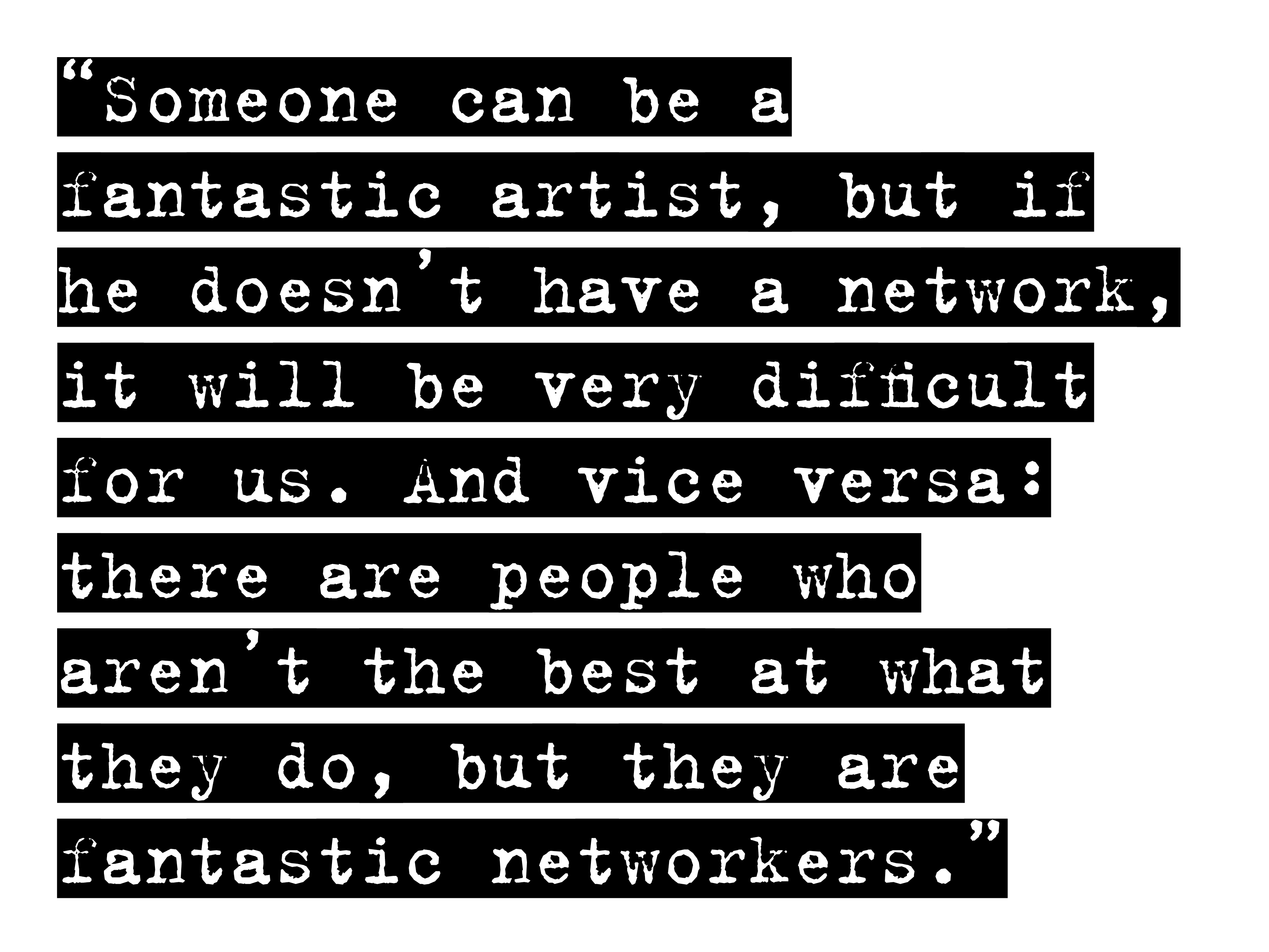
For musicians, the world of artist management can seem bewildering. At its heart is the chicken and egg problem. Presenters take musicians with agents more seriously, but agents only accept musicians who already have a good relationship with presenters—whose concerts they know they can sell. “Someone can be a fantastic artist, but if he doesn’t have a network, it will be very difficult for us,” said Witt. “And vice versa: there are people who aren’t the best at what they do, but they are fantastic networkers.” For young performers, major competitions are one of the few paths to representation with renowned agencies. And yet these competitions are frequently unfair, with jury members’ students favored and independent artistic visions rejected in favor of bland virtuosity.
In a study in Music and Practice by Esther Bishop and Martin Troendle, which surveyed graduates in German orchestral performance programs between 2004 and 2014, nearly 70 percent of respondents rated the availability of “information about future work perspectives” as “insufficient or bad.” The study also noted that while 77 percent of the musicians hoped to secure an orchestral job on graduation, only 23 percent were able to do so as their primarily employment. These numbers go some way toward explaining the willingness of young musicians to enter into dubious career-building schemes: Composition masterclasses that cost as much as a used car; opera houses that run on interns working 60-hour weeks for the minimum wage or less; ringers who play with the same orchestra for years without ever getting hired. For classical musicians who have been training for this career their entire lives, it is particularly hard to transcend the sunk cost fallacy. In a brutally competitive industry, the boundary between hope and desperation is thin and porous.
On May 3, 2016, a Facebook page appeared calling itself “Xenia Evangelista Communications Opinion.” Its profile picture contained large white letters spelling out the word TRUTH against a black background, and its posts warned to “be careful when signing a contract with XENIA EVANGELISTA. You are paying for something that you can not check if it is done.”
On June 28, 2016, Evangelista told Sanna and his partner that they would need to continue paying their fee for the original duration of their contract and throughout a cancellation period of three months. Though all their previous communications had been in English—Sanna, who studied performance in Cologne, speaks German, but his partner does not—Evangelista switched into highly bureaucratic, legalistic German. On June 30, Sanna wrote that it was becoming difficult to keep up with the monthly payments to the agency, and accused Evangelista of “the purest cynicism” in signing artists, then not finding concerts for them. Sanna added that he would tell friends and acquaintances about his experience with her company. The same day, Evangelista wrote again. She said that if Sanna and his partner refused to pay their monthly fee until the end of the contract, she would pursue them through her “worldwide operating” lawyers. She threatened “to have your assets foreclosed on during one of your performances, if you elude us.” She also accused the duo of intending to commit blackmail. “Maybe our words our written passionately, but no crime, no blackmail is contained,” Sanna answered. “We apologize if it has been received like that, it was not our intention.”
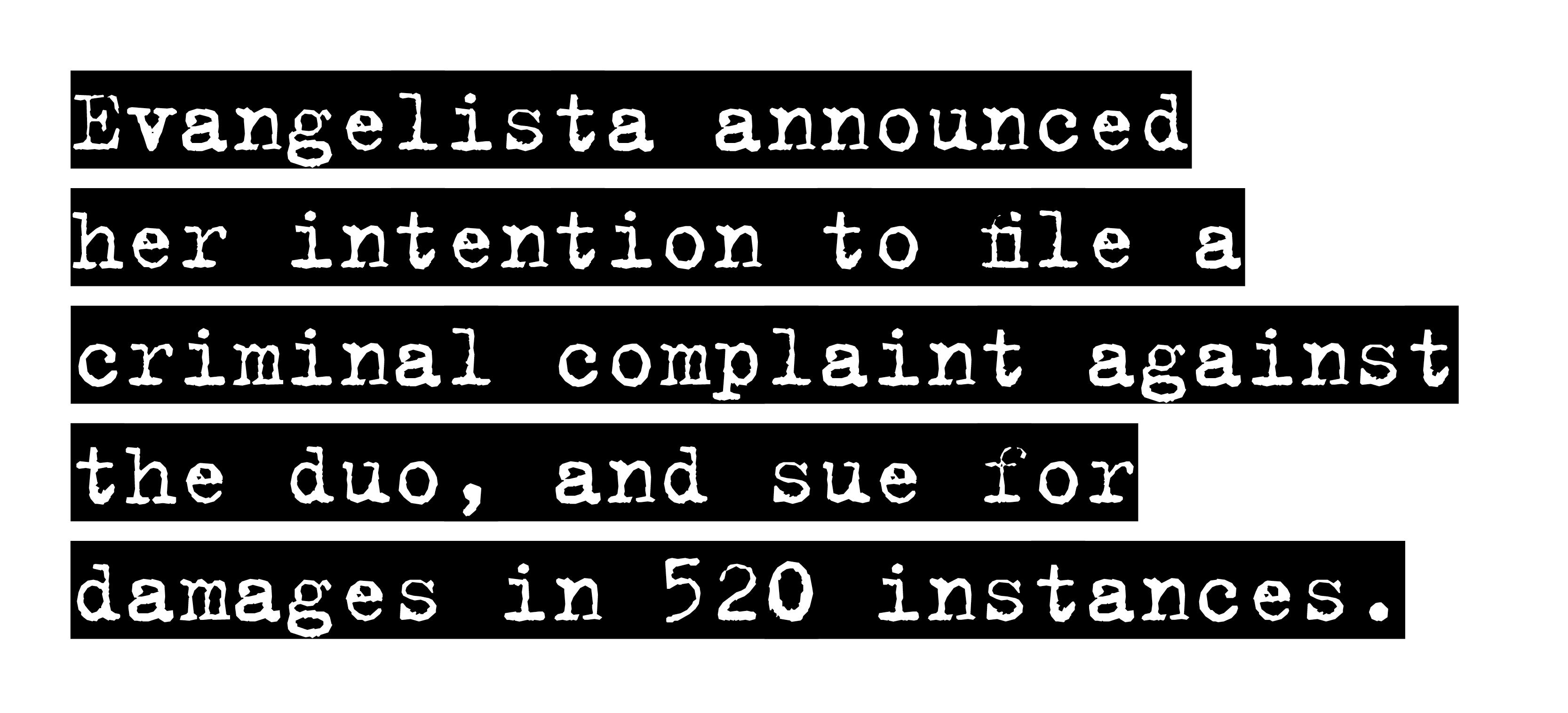
A few hours later, Evangelista contacted Sanna again. Without citing evidence, she accused the duo of being behind “Xenia Evangelista Communications Opinion.” (Sanna emphatically denied creating the page, and said he was only made aware of it due to Evangelista’s email. The page predates the duo’s intention to cancel its contract by nearly two months.) Evangelista announced that she was going to file a criminal complaint against the duo, and sue for damages in 520 instances, a number apparently drawn from the number of likes on the page. Sanna responded promptly to the accusations, writing, “WE HAVE NOTHING TO DO WITH IT.” As far as the blackmail allegations were concerned, a criminal complaint was never filed, nor was a suit for damages brought against Sanna and his partner. But the duo continued paying the monthly fee until their contract with Xenia Evangelista Communications ended. “She made us fear,” said Sanna.
On October 31, 2016, Sanna wrote to Evangelista one last time, asking for a report on her activities on behalf of the duo. She didn’t answer. In recent interviews, Sanna pointed out that, as a young musician at the beginning of his career, he could never have afforded to hire a lawyer to defend himself against Evangelista’s allegations. In the course of fifteen months, he and his partner paid Evangelista 4,500 euros—an amount that made a significant dent in the fragile finances of two young musicians, but which was also not enough to be worth the trouble and expense of a legal battle.
In November 2018, Davide Bravo of Trio Hegel asked Evangelista for a progress report again. Within an hour, Evangelista replied, accusing Bravo of “illegally communicating” with someone she named only by the first initial of his last name. She noted that she had already blocked Bravo on her social media and accused him of breaching the non-disclosure clause of Trio Hegel’s contract with her agency. It takes time to place young musicians on the market, she added, and said that, due to the new European General Data Protection Regulation, she would be unable to share a list of promoters she contacted on behalf of the trio. Bravo told Evangelista he had no idea which person she was talking about. The next day, Evangelista told Trio Hegel, “We have evidences [sic]” that the group was in breach of contract. She didn’t tell the group what kind of evidence.
Later that month, Davide Bravo tried to organize a meeting in Munich with Evangelista. Due to scheduling conflicts, the meeting never took place. Trio Hegel’s contract with Xenia Evangelista Communications ended without the group being booked for a single concert.
Xenia Evangelista Communications was founded in 2006. According to its website, the agency currently represents 37 artists from around Europe, including conductors, instrumentalists, singers and ensembles. However, the number of musicians signed to the company is likely higher. In June 2018, a pianist named Detlev Eisinger asked Evangelista why he was not listed on her online roster. She responded that she would do so after he secured his first concert through her. Several other musicians reported that they were told the same thing.
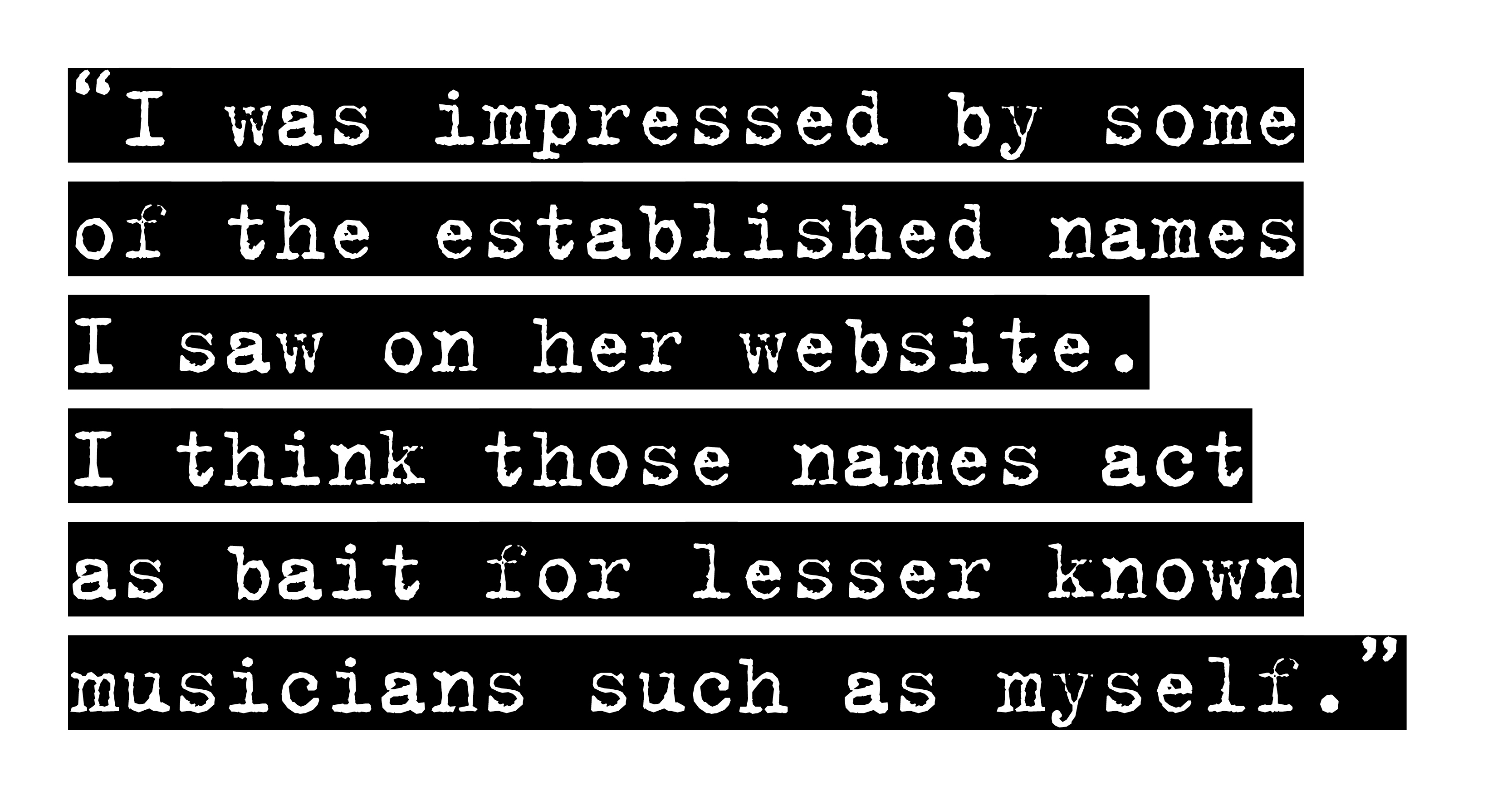
Not all the musicians listed on the website roster pay under the same fee structure. VAN learned that Xenia Evangelista Communications also represents artists who don’t pay monthly or “acceptance” fees. “I was impressed by some of the established names I saw on her website,” said a violinist who asked to remain anonymous. “I think those names act as bait for lesser known musicians such as myself.” She paid Evangelista 350 euros per month for six months.
VAN spoke with a total of 15 musicians who were signed with Xenia Evangelista Communications. In most cases, the initial contact was made through social media. Evangelista got in touch with the pianist Detlev Eisinger on LinkedIn. “That probably should have alerted me,” Eisinger said. “Usually it’s the musician who gets in touch with the agency, not the other way around.” The violinist began following Xenia Evangelista Communications on Instagram. “I felt flattered and thought, if she’s interested in me, why not write to her?” she said. On Facebook, the Xenia Evangelista Communications pays for sponsored posts announcing auditions. It’s not clear if these auditions ever take place. In response to inquiries about them, a mezzo-soprano named Martina Gmeinder and a clarinetist named Nicolai Pfeffer received exactly the same response: “Unfortunately, all our auditions slots our booked. However, I was able to get a thorough sense of your ability. My inquiries and searches are now complete. And I’m looking forward to successfully helping you achieve your vocational goals and warmly welcome you to our agency.” In her email to Gmeinder, from April 2018, Evangelista attached a draft contract that she had already signed.
Gmeinder insisted on a face-to-face meeting before signing her contract. She met Evangelista in an Italian restaurant in Munich that May. “We spent five hours together, she spoke very convincingly, I could hardly tear myself away,” Gmeinder said. “She seemed like a tough woman who knew what she was doing.” Gmeinder paid Evangelista 2,800 euros in the course of eight months. The pianist Detlev Eisinger recalled that, in his first meeting with Evangelista, she seemed to be lacking some classical music-specific knowledge. He repressed the feeling that something wasn’t quite right. He paid her 4,550 over 13 months. By the time Nicolai Pfeffer, the clarinetist, had a meeting with Evangelista on January 28, 2019, in a rented conference room in the prestigious Maximilianstrasse, he and his duo partner had already paid her a 4,500 euro acceptance fee. “The conversation was sobering,” Pfeffer said. “She hadn’t heard of the violinist Renaud Capuçon. There were no artist photos or CDs in the office, which you would expect to see. She talked about her good connections to American orchestras, which made me wonder why people there would be interested in a clarinet and piano duo. When the meeting was over, the first thing I did was call my duo partner and tell him, ‘Something is off.’”
Many musicians use the term “scam” in discussing Xenia Evangelista Communications, but the legal reality is more complicated. VAN consulted several lawyers about her contracts. They agreed that, though the agreement seemed unfair, it was not necessarily illegal. After all, the musicians who signed it did so of their own free will. “I took the risk consciously…partly because I did have a feeling that it was a fake contract, honestly,” said a singer who asked to remain anonymous. “If nothing comes from the other side it’s not a valid deal. And I wanted to give her a chance. As an artist, you have to take risks to get further. It’s a difficult, lonely way. We study and work hard to be able to pursue it.” “I don’t blame the musicians for signing the contract in complete trust,” said Jeremias Mameghani, a Düsseldorf lawyer, who is collecting testimony from musicians for a possible civil suit against Evangelista. “It’s difficult for a layperson to recognize the potential problems.” Mameghani confirmed that Evangelista has threatened to sue his clients for damages and other payments. He said that, so far, she hasn’t followed up on these threatens, “because she is probably reluctant to go to court.”
In December 2018, a lawyer acting on behalf of an Italian musician filed a formal complaint against Evangelista with the Munich state prosecutor. The prosecutor declined to investigate. In a letter obtained by VAN, it argued that Evangelista would need to have intended not to fulfill her end of the contract for her behavior to constitute fraud. But Evangelista’s contracts give her agency no enforceable obligations. Though she sends artists a “services catalogue” which lists “acquisition and realization of engagements and performances,” “specific, direct contact with the target group,” and “development of unique selling points,” among other services, the catalogue is not a binding section of the contract. When musicians complain that Evangelista isn’t doing enough for them, she responds that she is under no contractual obligation to keep them informed of her activities, or that data protection laws prevent her from sharing the extent of her contacts with promoters.
Yet the accusation that Xenia Evangelista Communications does nothing is extremely difficult to prove. Promoters and musicians told VAN that they had received mailings including artist biographies and repertoire lists from Evangelista. On her website, she features “dossiers” including biographies, photographs, YouTube links and CDs of the artists (this content is often supplied by the artists themselves). Clearly, Evangelista has secured concerts for some of her artists. But that was not the case for any of the musicians VAN spoke to for this story. And it seems impossible that a one woman agency like Xenia Evangelista Communications would be able to simultaneously give dozens of young artists in all genres the kind of intensive consultation they each need to be successfully placed on the market.
“Some artists ask me, ‘Why do you have 20 people in the office?’” said Karsten Witt, the Berlin artist manager. “That was never the plan. But we’re active in many different networks: early music, new music, opera, orchestras, chamber music. We need people who are connected and competent in each of these different networks. And then we do general management, so we need people with networks in different countries. That’s how we ended up so big. These companies that are run by just one person—I don’t understand how that can be done responsibly.”
Xenia Evangelista Communications runs on expectations that can hardly be realistically satisfied. “We are very well connected all over Europe and in the United States,” wrote Evangelista to the mezzo-soprano Martina Gmeinder. “We have access to a database of 12,000 contacts, all of which I can’t list at this point. But it’s definitely enough so that the harvest bears fruit.” Another formula that repeats in Evangelista’s emails is, “Specifically to the major concert halls and festivals in whole Europe and USA [sic] we have very good and long-standing relationships.”
The use of legal-sounding German, and the threat of lawsuits, appears to be a fixed part of Evangelista’s business strategy. A musician who posted on Facebook that his colleagues should avoid agencies which collect monthly fees—he didn’t mention Xenia Evangelista Communications by name—received a cease and desist notice from a Munich law firm called Curos on behalf of Evangelista. Through lawyers, Evangelista has threatened several musicians that she would sue them for damages of up to 50,000 euros. In draft contracts that VAN obtained, artists agreed “not to make any negative statements, during and after the duration of the contract.” The clause is effective. By accusing musicians of breach of contract and claiming that they are both civilly and criminally liable, Evangelista frightens artists. Even if they continue to grumble in private, it is difficult to find information about Evangelista’s business model online. “I never had anything to do with lawyers before,” said Detlev Eisinger, the pianist. “It makes you hesitate.”
On February 28, 2019, we contacted the conductor Srba Dinić, the music director of the opera in Braunschweig, Germany. VAN wanted to speak with him because he appears to be an example of a musician for whom Evangelista has had success in selling concerts, at least according to the agency Facebook page. Dinić acknowledged that she was his agent, but wrote that he had never met her in person. He then told Evangelista about our inquiries. That day, she left us a Facebook voice message. “Several of my artists have contacted me to say that you’ve been asking about my contracts,” she said, in highly formal German. “First of all, I’d like to know what that’s about. And second, that I’ll have to speak with my lawyer about it. I don’t understand why private business contracts should reach the press. That’s my agency’s business. I can imagine what is behind all this and would like to speak to you about it.”
Shortly after, we called Evangelista. She declined to meet face-to-face for an interview in Munich, and said she would answer specific questions in writing via email. Still, we spoke for half an hour. She said that there was a “campaign of hate against me,” and that “two people are trying to destroy me.” When asked who was behind the campaign, she declined to answer. At the beginning of the call, she sounded self-assured, and spoke in the complete, nested German paragraphs of a corporate officer or official. As our conversation continued, however, she sounded less put together. Several times, she repeated, “I’m an honest person, and I don’t need to explain myself.” When asked whether she takes an acceptance fee from artists, she declined to answer, but added, “even if I did, it wouldn’t be illegal.” We asked how she judged the career prospects of the artists she added to her agency’s roster; she countered that she rejects most applicants. “My only mistake was not to find concerts within the shortest period of time for artists who are impossible to sell,” she said.

Evangelista also said that part of the campaign against her was to imply that she didn’t work from a real office. Until recently, the website of Xenia Evangelista Communications listed its address as Maximillianstraße 2, across from the national theater. But a brief internet search shows that the building, Palais an der Oper, offers virtual offices and space by the day. “Even if I was working from a basement somewhere, it wouldn’t be illegal,” said Evangelista. She added that she had been prescribed beta blockers by her doctor due to the stress of the campaign against her, and began to cry: “I’m begging you not to run this story.”
On March 18, 2019, VAN emailed Evangelista, again asking for an opportunity to meet her in person in Munich. A few hours later, she called from a blocked phone number. In a 40-minute conversation, she declined to meet, asked for questions to be submitted in writing, and repeated her accusation that she was being targeted by a coordinated libel campaign motivated by personal hatred. She declined to provide evidence of this campaign or the names of her harassers. “I know you’re not on my side,” she said. “I’m afraid of you.” She added that she had been receiving mysterious phone calls in the middle of the night, and that an artist had threatened, “You’ll never be able to sleep in peace again.” We asked Evangelista if she had thought about abandoning her agency, considering the amount of personal suffering it seemed to be causing her. “I’m not ready to give it up,” she said, “so that [my opponents] can dance on my grave.”
On March 22, lawyers from the Munich firm Brehm & v. Moers sent VAN Magazine a cease and desist letter on behalf of Xenia Evangelista Communications. Referencing the conversation on Facebook Messenger with the conductor Srba Dinić, as well as an alleged phone call to Dinić that never took place, the firm argued that because VAN provides some services to artists, its real intention in reporting on Evangelista was to poach musicians represented by her agency. (VAN, like many other newspapers and magazines, does offer some commercial services, through its agency VAN VON. These services include photography, biography writing, and website design. VAN does not represent or book concerts for any artists.) Brehm & v. Moers argued that VAN’s reporting had already hurt Evangelista’s business, and said that VAN must inform Evangelista about the extent of its reporting so that a calculation of liability for damages could be made. The firm seeked to have VAN sign an agreement—by a deadline of March 27—that the magazine would not contact artists who are signed with Xenia Evangelista Communications, and that it would “neither verbatim nor in the general sense” report that Evangelista “charges unnecessarily high fees or doesn’t work correctly.” Through its lawyers, VAN rejected the accusations and notified Evangelista that it would continue to pursue the story.
Xenia Evangelista Communications offers a potent form of hope to performers. Evangelista is like a kind of blank screen onto which musicians can project their expectations and dreams of a career in music without the drudgery and humiliation it so often takes. It is only natural that musicians prefer to spend their time actually making music, rather than writing emails and pitching concerts. In communications between Evangelista and performers we reviewed, the musicians displayed a touching vulnerability, what George Eliot, in Middlemarch, called “the pathetic loveliness of all spontaneous trust.” Musicians spoke with enthusiasm about gigs and traded personal news with Evangelista. The awareness of their own naïvité acts as a brake on musicians sharing their experiences with Evangelista in public. So does embarrassment. Without talking to others, a musician might think she was the only person who didn’t get a single concert in a year. “On a very basic level, you have to ask how ‘desperate’ some of the musicians were to sign a contract that requires a deposit of trust, belief, and money,” said a performer. “It’s a sign that young musicians, who are highly specialized and educated, often find themselves in uncertain economic straits, and fall for things.”
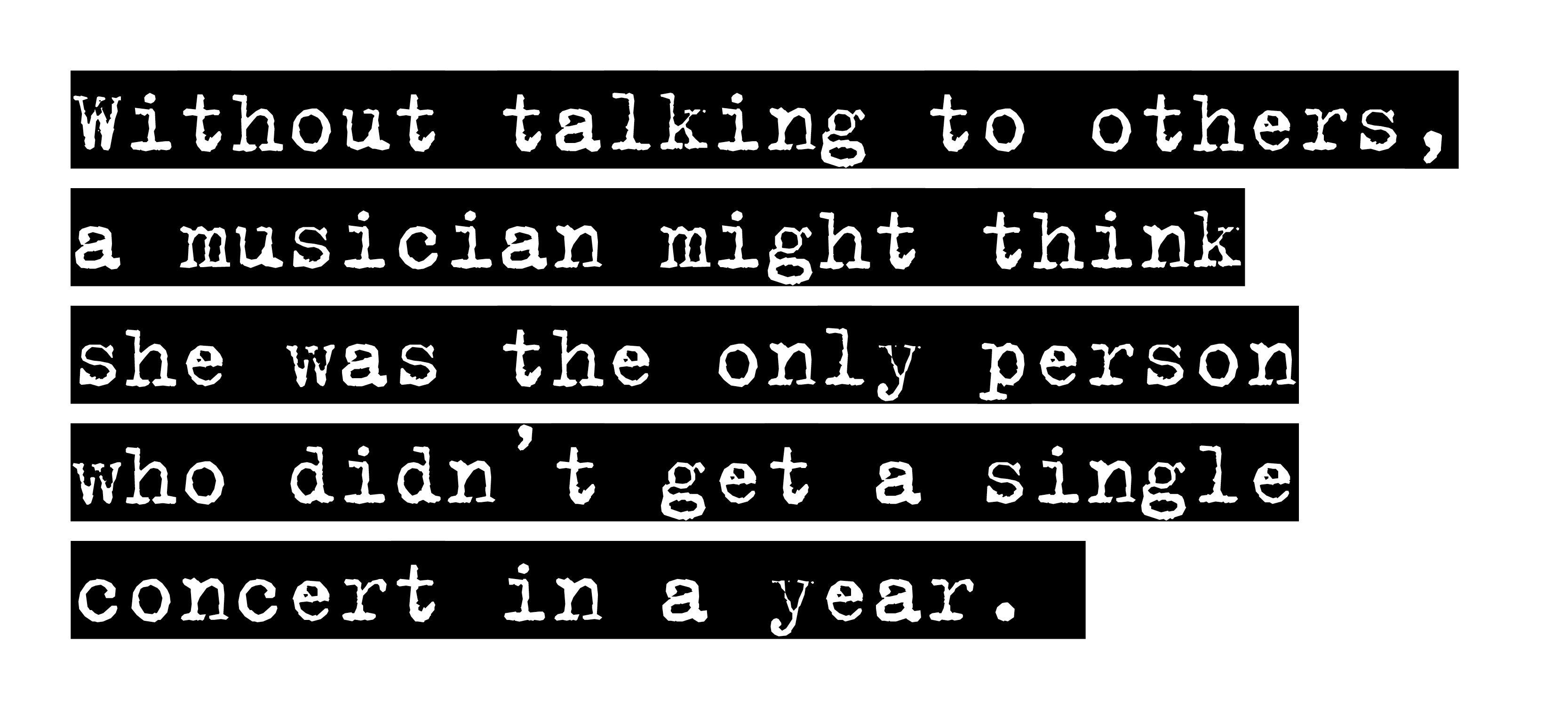
The combination of necessary professional arrogance, high hopes, and even bigger disappointment has allowed conspiracy theories to gain currency among the musicians who feel cheated by Evangelista. Davide Bravo said that one of his colleagues seemed “a little obsessed” with her. That artist had taken to contacting the musicians who were announced on Evangelista’s website and warning them. As the reporting process for this story took longer than two musicians expected, they began circulating rumors that we had received money from Evangelista in order to kill the piece. “I was hoping that your investigations proceeded faster but this was not the case,” one wrote in March. “There were 10 days of emptiness and Xenia Evangelista was contacted and had the opportunity to create alibis and false evidence.” But conspiracy theories are, perhaps, an understandable reaction to an unpleasant if essential truth about democracy, that what is unfair is not necessarily illegal; and about music, which is that most careers are doomed to fail.
Evangelista seems to believe in conspiracy theories too. She said that her agency has become the target of “pure hatred” by artists who have been “shot down” by the market. While she sounds stuck in a bitter present, some of the artists she once represented have moved on. “Back then we were naive and stupid,” Marco Sanna said. “I’m over it, it’s been three years.” ¶

